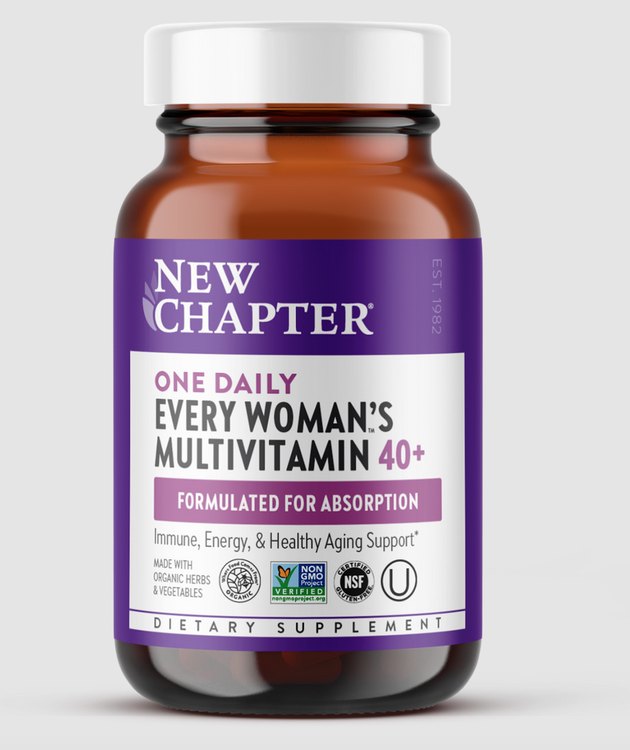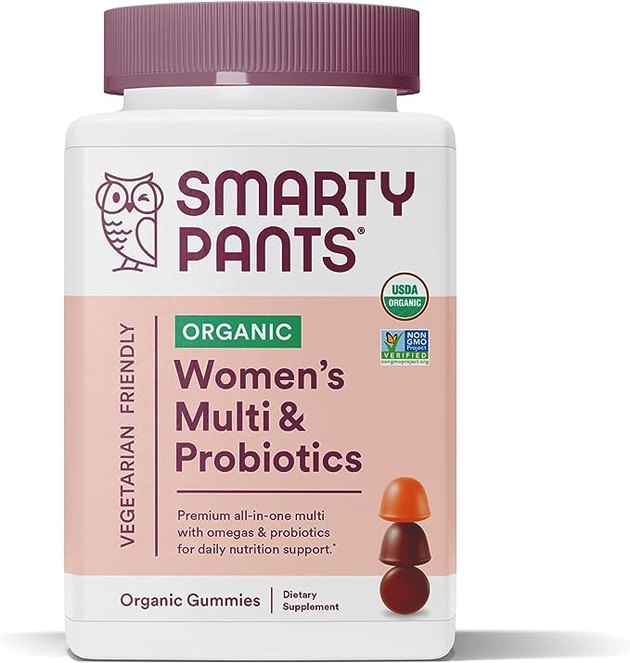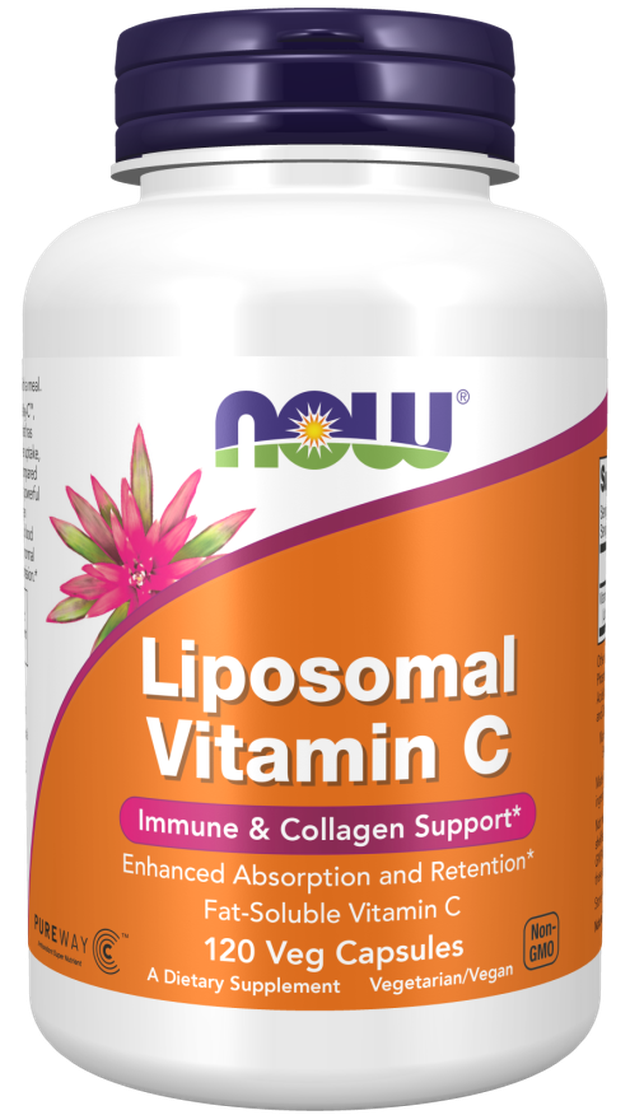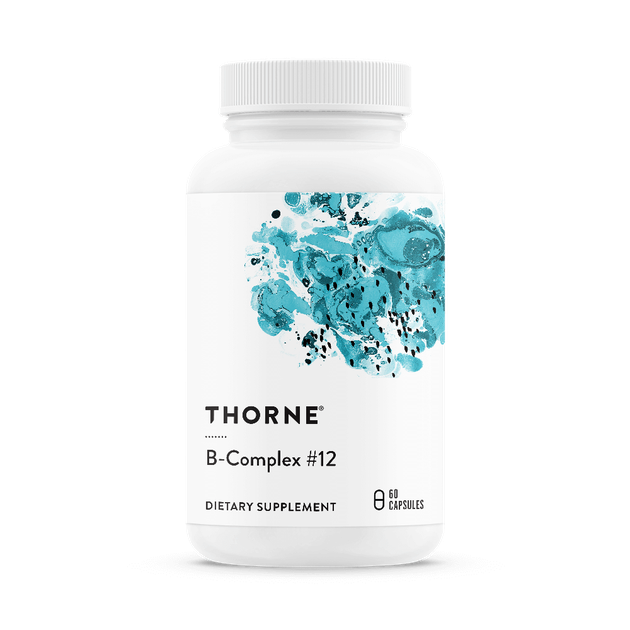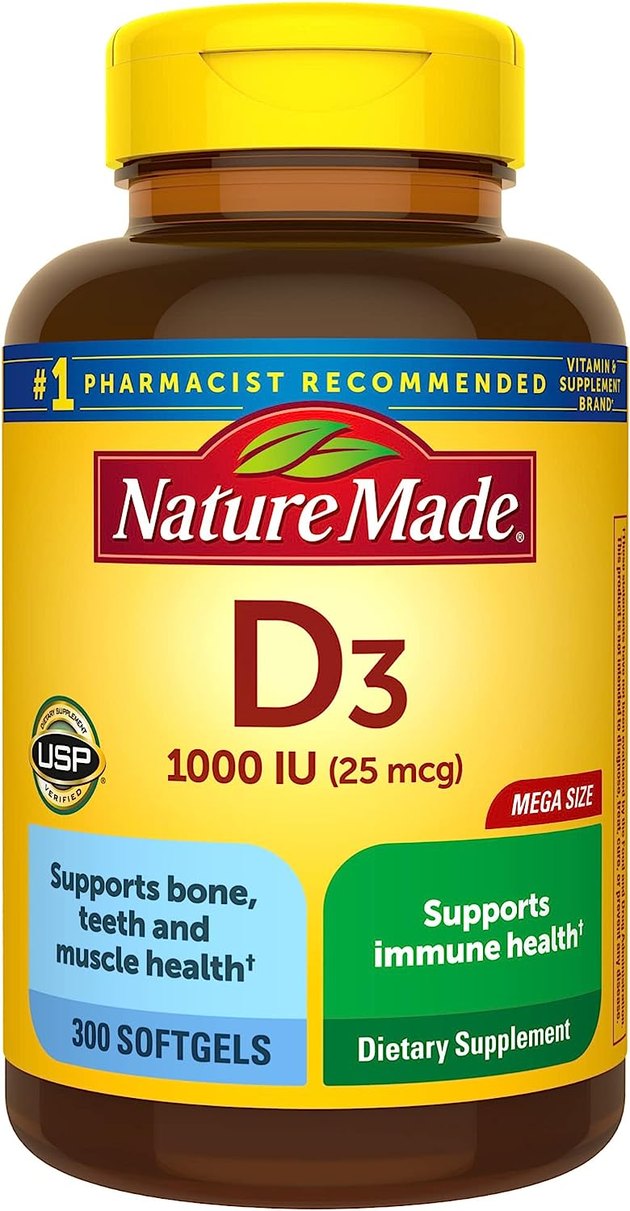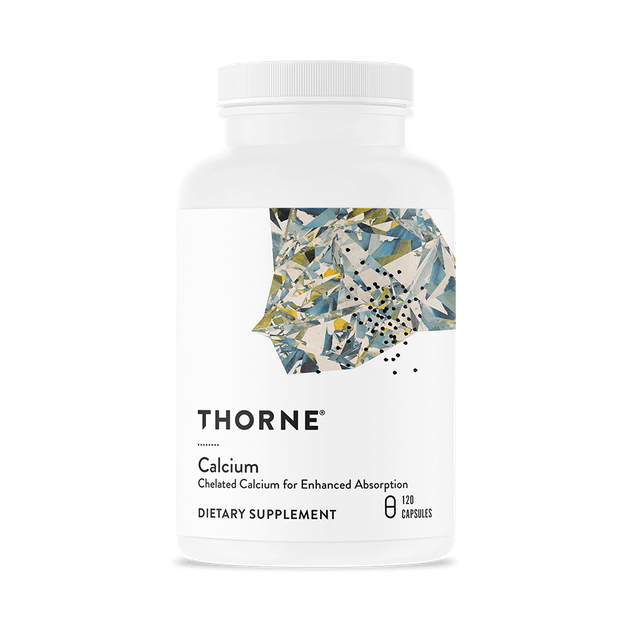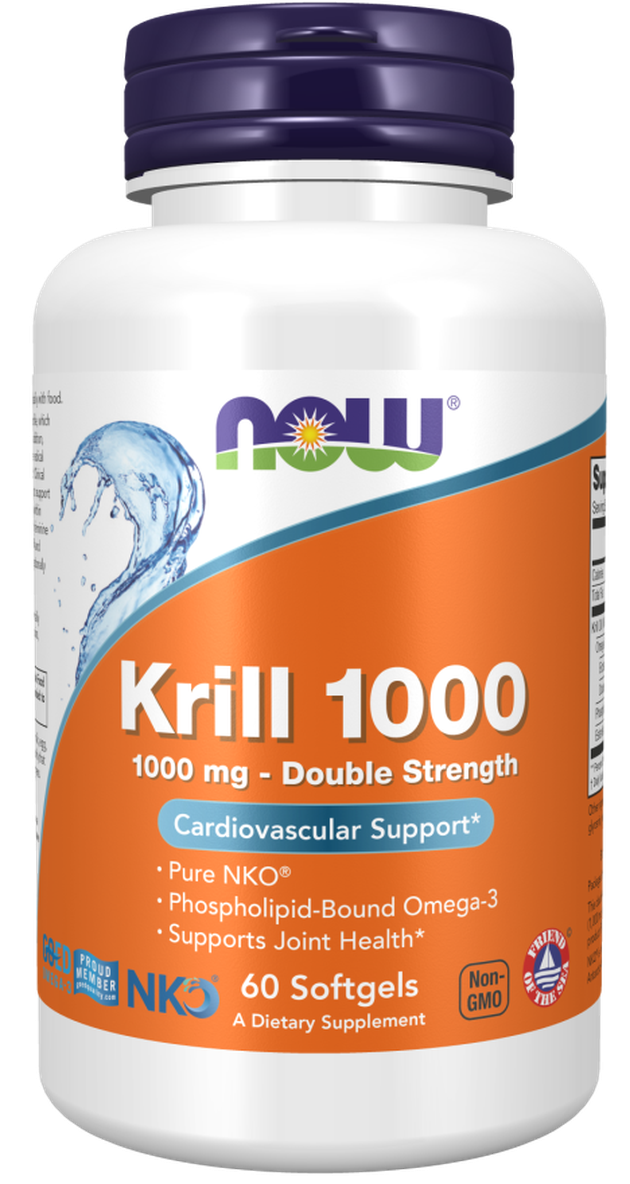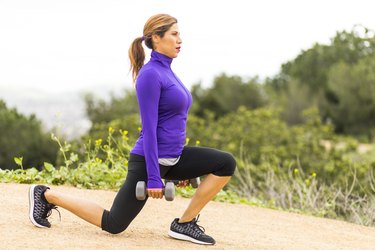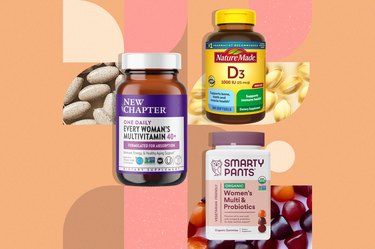
Around age 40, you might start to notice quite a few changes in how your body functions. It's no wonder, then, that your nutrition needs start to shift, too.
And while it's always best to get your vitamins and minerals from the foods you eat, no one has a perfect diet all the time — and a good supplement can help you fill in the gaps.
Video of the Day
Video of the Day
Just make sure to talk to your doctor before starting a new supplement — especially if you're on medication — to make sure it's right for your specific needs.
With that in mind, here are the best supplements and vitamins for women in their 40s and the most important nutrients to get during this phase of your life.
The Best Supplements for Women Over 40
- Best Multivitamin: New Chapter Women's Multivitamin 40+ ($36.32, Amazon)
- Best Gummy Multi: SmartyPants Organic Women's Multivitamin ($35.10, Amazon)
- Best Vitamin C: NOW Liposomal Vitamin C ($19.99, Amazon)
- Best B12: Thorne B-Complex #12 ($20.90, Amazon)
- Best Vitamin D: Nature Made Vitamin D3 ($9.29, Amazon)
- Best Calcium: Thorne Calcium ($21.85, Amazon)
- Best Omega-3: NOW Krill ($25.65, Amazon)
How We Chose
We spoke to registered dietitians and a board-certified ob-gyn about what to look for in a supplement for a woman in her 40s, and discussed their top picks. Then, we researched dozens of products based on our experts' recommendations and included quality products that adhere to the FDA's Current Good Manufacturing Practices (CGMPs) and/or have verification from independent quality control organizations, such as:
Why Are There Different Recommendations for Women and Men?
Body composition and body function are different for men and women, so nutrient recommendations are often different, says registered dietitian DJ Blatner, RDN, CSSD.
The Recommended Dietary Allowance (RDA) for many nutrients is higher for men than women. "This is because men tend to have a larger body size and more muscle mass than women," Blatner says.
For example, RDA for vitamin C is 75 milligrams per day for women and 90 milligrams per day for men.
However, recommendations are not always different for men and women. For example, the RDA for vitamin D for 19 to 50-year-old men and women is the same: 600 IU per day.
"Another thing to note is that women have different needs in their 40s than men because, for most women, this is their perimenopausal decade," Blatner says. "During this time, estrogen levels slowly decline and women are likely to see changes in their skin and joints and may need extra support for bone and heart health."
1. New Chapter Every Woman's One Daily 40+ Multivitamin
Pros
- Contains more than 20 vitamins and minerals
- NSF Certified
- Can be taken on an empty stomach
- Gluten-free
- Kosher
Cons
- Contains soy, so it's not suitable for people with soy allergies
- Doesn't contain much calcium
This multivitamin by New Chapter is specifically formulated for women over 40. It contains 100 percent of your daily value (DV) of plenty of essential vitamins and minerals, including vitamins A, B12, C, D3, E, K and selenium, among others. You'll also get at least 50 percent DV for zinc and folate.
"In general, multivitamins don't replace a healthy diet, but rather serve as insurance to prevent micronutrient deficiency," says Destini Moody, RDN, a dietitian with Top Nutrition Coaching. "This is especially true for women over 40 who may lack certain enzymes needed to properly digest all of their nutrients from food."
One such nutrient is vitamin B12, which New Chapter has taken care to include, along with vitamins D and K to support bone health, Moody says.
What's more, this supplement is NSF Certified, so you know it's free of contaminants and actually contains what it claims on the label.
Plus, this multi is easy to take, as it's just a once-daily pill, and it's OK on an empty stomach.
2. SmaryPants Organic Women's Multivitamin
Pros
- Contains probiotics and omega-3s
- Third-party-tested for purity
- Organic
Cons
- Contains 7 grams of added sugars
For women over 40 who already take several prescription capsules or other supplements, gummy multis like this one from SmartyPants can make life a lot easier.
"SmartyPants includes vitamin B12 and nutrients for bone health, but also includes omega-3 fatty acids," which may help support brain health as you age, Moody says.
"Also, depending on how strong your sweet tooth is, it can be a supplement to help women in their 40s consistently take their multi because it's a treat to look forward to," Moody says.
3. NOW Liposomal Vitamin C
Pros
- Easily absorbed
- Vegan/vegetarian
- Third-party certified brand
- Research-backed
Cons
- Capsules are on the larger side
- Best taken with food
Vitamin C is especially important as you age because it's an antioxidant that neutralizes free radicals that can damage healthy cells, per the National Council on Aging.
Our bodies don't store vitamin C, which is why it's so important to get the nutrient through your diet each day. While eating plenty of vitamin C-rich foods should always be priority, a supplement can also help you meet your needs.
"The specific type of fat-soluble vitamin C used in this supplement (called PureWay-C) has been used in research and shown to be better absorbed and retained than other forms of vitamin C," Blatner says.
4. Thorne B-Complex #12
Pros
- Easy to swallow
- Produced in a cGMP facility
- Third-party-certified
Cons
- High biotin content (which may lead to acne in some people)
This B-complex supplement provides all your B vitamins with an especially hefty dose of B12 as well as folate.
"Thorne provides 41,667 percent of your daily value of vitamin B12 and it comes in an easy-to-manage capsule," Moody says. "B12 supplements are so important for women in their 40s, as deficiency symptoms can be quite unpleasant and affect quality of life," she adds.
Some common symptoms of low B12 include fatigue, weakness, difficulty thinking clearly and poor memory
5. Nature Made Vitamin D3
Pros
- Provides plenty of vitamin D
- USP-verified
- Easily absorbed
Cons
- Softgels may stick together
Vitamin D is such a crucial nutrient — it supports your immune system, bone health, heart health and more — but many adults are deficient in it. If your blood tests show that your D levels are low, you might consider adding a supplement to your routine (especially because it can be tough to get enough vitamin D from food).
Nature Made is a USP-verified brand and this vitamin D supplement contains 1,000 IU of the nutrient.
"Considering the RDA for adult women is 600 IUs, one can rest assured they are getting more than enough to support the bones of a woman in her 40s and up," Moody says.
And the amount is still well within the safe range, Moody says: "Vitamin D has an upper limit of 4,000 IUs, so as long as this supplement is taken as directed, you should be fine."
6. Thorne Calcium
Pros
- Easily absorbed form of calcium
- Produced in a cGMP facility
- Third-party-certified
Cons
- Contains just 19% DV of calcium
Calcium, along with vitamin D, is essential for bone health.
"This risk of bone fractures is much higher in women due to menopause, which begins to happen in the 40s and 50s, as the sudden decrease in estrogen leads to bone loss," Moody says. "Thorne provides a chelated form of calcium that has been shown to be better absorbed than other calcium supplements, which is ideal for the digestive system of women in their 40s."
The recommended dose of calcium for women ages 40 and up is from 1,000 to 1,200 milligrams, says Tamika Cross, MD, FACOG, a board-certified ob-gyn and pH-D Feminine Health Advisor. And calcium supplements can help you reach your DV, especially if you don't eat dairy.
7. NOW Krill Oil
Pros
- Third-party tested for PCBs, dioxins, mercury and other heavy metals
- Gluten-free
- Softgel is easy to swallow
Cons
- Isn't suitable for people with a shellfish allergy
Omega-3s are an essential nutrient we cannot make on our own and must get from our diet.
"Unfortunately, as we age, dentition [teeth arrangement] issues and a change in taste can affect our ability to eat foods rich in omega-3 fatty acids, so supplements like NOW Krill Oil can be of assistance," Moody says.
Krill are shrimp-like crustaceans that are rich in omega-3 fats.
"As an omega-3 supplement, Krill Oil is my favorite because studies suggest it is more digestible and more easily absorbed than fish oil," Moody says.
What to Look For in Vitamins and Supplements
1. Quality and Third-Party Verification
Unlike medications, supplements aren't regulated by the FDA. However, the FDA sets cGMPs, and following them ensures the strength, quality and purity of a supplement.
This is essential because "most people cannot detect through look, feel or smell if a supplement is safe," Dr. Cross says.
You'll also want to look for third-party certification seals, like those from the USP or NSF. These independent quality control organizations vet products to make sure they're free of contaminants and contain what they claim on their labels.
2. Free of Allergens
If you're allergic to any foods or ingredients, make sure to scan your supplement's ingredient list and label to make sure the product doesn't contain the allergen.
For example, many supplements are made with soy or gluten, so you'll want to avoid those products if you're allergic.
Important Nutrients in Your 40s
1. B Vitamins
All of the eight B vitamins, including thiamin, riboflavin, biotin, B12, B6, niacin, pantothenic acid and folate, play a role in your metabolism, which is the process by which your body uses food for energy, per the U.S. National Library of Medicine.
Not getting enough of any one of these nutrients could affect the efficiency of your metabolism and make you feel sluggish.
Vitamin B12 deficiency is fairly common, especially because you become less able to absorb the vitamin as you age, according to Harvard Health Publishing. Common symptoms of low B12 include:
- Fatigue
- Weakness
- Difficulty thinking clearly or poor memory
- A swollen, sore tongue
- Numbness or tingling in the hands, legs or feet
- Difficulty walking and poor balance
The recommended daily intake of B12 for women is 2.4 micrograms, according to the National Institutes of Health (NIH). If you're pregnant, you need 2.6 micrograms, and if you're breastfeeding, you need 2.8 micrograms.
The richest sources of B12 are animal foods, including clams, beef liver, trout, salmon, tuna, beef, milk, yogurt and cheese. Some plant-based foods are fortified with B12, too, including nutritional yeast, whole-grain bread and many breakfast cereals.
Tip
Folate, also called folic acid, is an especially important vitamin for pregnant people because adequate levels of the vitamin can help prevent birth defects. The NIH recommends getting 400 to 600 micrograms of folate per day from food or supplements.
2. Vitamin D
Getting enough vitamin D may also be crucial. Vitamin D is a fat-soluble vitamin that acts as a hormone and is important for bone health, heart health and more.
"Vitamin D is an essential supplement for women in their 40s because it works in tandem with calcium to support blood calcium levels and to build and maintain bone mineral density," Dr. Cross says.
Vitamin D deficiency may cause a rise in blood pressure, which is linked to an increased risk of heart attack, stroke and heart failure, per a June 2018 review in Clinical Hypertension.
Your body can synthesize vitamin D when it comes in direct contact with UVB rays from the sun; but due to more time spent inside at desk jobs and the increase in sunscreen use, vitamin D deficiency is very common.
"Most people are not making enough vitamin D from the sun or getting enough from their diet (since there are not many food sources of vitamin D)," Blatner says. "Plus, with age, our skin produces less vitamin D, so supplementing becomes more likely to keep levels in a healthy range."
3. Calcium
The mineral calcium is responsible for supporting the structure and function of bones and teeth, per the NIH.
Bone remodeling is the process by which the body breaks down old bone and uses calcium to create new bone. In adolescence, bone regeneration typically outpaces bone breakdown — but as you age, breakdown begins to exceed rebuilding, which results in bone loss. That's why getting enough calcium is so important.
Vitamin D is necessary for the absorption of calcium in your gut, and it helps maintain adequate levels of calcium and phosphate also required for the creation of new bone. Without enough vitamin D, bones become brittle, thin and misshapen.
In addition to the recommended daily intake of vitamin D, be sure to get the 1,000 milligrams of calcium recommended for women in their 40s. The best sources of calcium are dairy products, including cheese, yogurt and milk, as well as fish with bones, such as canned sardines.
4. Vitamin C
Vitamin C is an antioxidant that supports the immune system and protects cells from stress and damage, Blatner says. It's also necessary for the production of collagen, an important protein for skin and joint health that declines with age.
"Collagen production decreases with age and can affect joint mobility and skin elasticity," Dr. Cross says. Translation: You might be more prone to injury and start noticing fine lines and wrinkles.
Sun damage further decreases collagen and has other damaging effects on the skin. Both dietary and topical vitamin C (think: serums) may help prevent and treat sun damage, and getting more vitamin C has also been shown to decrease the risk of dry skin, per the Linus Pauling Institute at Oregon State University.
The NIH recommends getting at least 75 milligrams of vitamin C each day to prevent deficiency. If you're pregnant, you need 85 milligrams daily, and breastfeeding people need 120 milligrams each day.
Vitamin C is abundant in fresh fruits and vegetables, including bell peppers, citrus fruits, broccoli, strawberries and Brussels sprouts.
5. Omega-3s
Omega-3 fatty acids are polyunsaturared fats found in fatty fish, such as herring, salmon, sardines and anchovies.
"Omega-3 is important for women in their 40s because it works as an anti-inflammatory, which may support heart health, brain health and joint health," Blatner says. "But 3 out of 4 people aren't eating enough fish each week for health benefits."
If you don't eat fish, you might consider adding an omega-3 supplement to your routine.
- NIH: "Health Risks of Being Overweight"
- Harvard Health Publishing: "Vitamin B12 Deficiency Can Be Sneaky, Harmful"
- NIH: "Vitamin B12"
- Guttmacher Institute: "Unintended Pregnancy in the United States"
- Office on Women's Health: "Healthy Living in Your 40s"
- CDC: "Women and Heart Disease"
- Clinical Hypertension: "Vitamin D Deficiency and Risk of Cardiovascular Diseases: A Narrative Review"
- NIH: "Vitamin D"
- National Osteoporosis Foundation: "What Women Need to Know"
- Harvard Health Publishing: "Perimenopause: Rocky Road to Menopause"
- Dermatology and Therapy: "The Role of Vitamins and Minerals in Hair Loss: A Review"
- AOCD: "Telogen Effluvium Hair Loss"
- NIH: "Vitamin C"
- Oregon State University: "Vitamin C and Skin Health"
